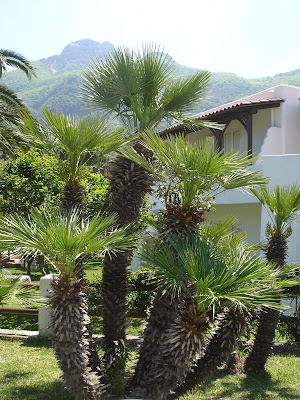Wednesday, May 13, 2009
Ischia Festival Chamber Orchestra

Elgar- Serenade for Strings
Mozart- Sinfonia Concertante for Violin and Viola
Byron Wallis- violin, David Yang-viola
We had a very good crowd for this evening’s chamber orchestra concert. In fact, concert attendance has been good all week- a testament to Aldo’s tireless efforts to raise the profile of the festival.
On paper, this may appear to be only half a concert, but given the setting- an after dinner concert at 9 PM in the grand lobby of the Hotel Grazia, I think it was the perfect length.
I’ve been putting off conducting the Elgar for many years- it is often requested by UK chamber orchestras, but I just can’t stomach hacking away at it on 15 minutes rehearsal time, which seems to be the expectation most places. We didn’t allow ourselves much rehearsal time here either, but we did have enough rehearsal time, and I think it was a rather magical performance. The strings played with real tenderness and sophistication.
The Mozart was also wonderful to do and it is interesting to hear how David and Byron’s interpretation has evolved since we last did it a couple of months ago. That said, I’ve lost track of how many times I’ve done the piece lately, so, unless the Chamber Orchestra of Europe asks me to record it, I’m putting it in the drawer for a few years. When you know a month before the first rehearsal what the problems are going to be in the first rehearsal, the last rehearsal and the concert, it ceases to be as fresh as it should be.
This was the first time in several years that there has been an orchestra concert as part of the Ischia Festival. Not surprisingly at a chamber music festival, reaction to playing in orchestra was somewhat mixed. For better or worse, many lovers of chamber music see orchestra playing as a lower form of music making. Of course, orchestra playing should be chamber music, whether it’s the Elgar String Serenade or Mahler 5. People may think of conductors as control freaks, and we may often be such, but we want to work with musicians who listen, react and play with imagination and intent.
Even for me, however, the question of orchestra is a somewhat complex one. Last year, I was able to come for a week and just be a cellist- nobody here even knew I was a conductor. This was wonderfully liberating for me, not only musically, but also in terms of simply being a musician and not an authority figure. As soon as you start waving a stick, people expect you to know when the next rehearsal is (I almost never do), where there music went, why we changed the program, what time the bus is leaving (I definitely never know this) and why their lunch was overcooked. It also sets you apart.
However, Aldo has the best of reasons for wanting a little bit of orchestra as part of his festival.It is the one time we all come together- all of the faculty coaches, the student fellowship quartet (who did a fine job yesterday playing the entire Schoenberg 1st String Quartet on their concert) and the workshop students. Aldo said it was beautiful to see all the different members of the festival playing together, and he couldn’t be more right. We all pay a price to achieve this- I lose a little bit of my cello-guy-ness, people give up about 3 hours of chamber music rehearsal time (and they may even have to share a stand!), but, on balance, I think Aldo was right. I hope that orchestra doesn’t have to suck, and that being a conductor doesn’t have to make me a dick. I hope that we can erase the line between chamber music and orchestra and treat everything as a collaboration. Something special happened in the slow movement of the Elgar that brought together everyone in the festival. What could be more “chamber music’ than that?
Bravo!